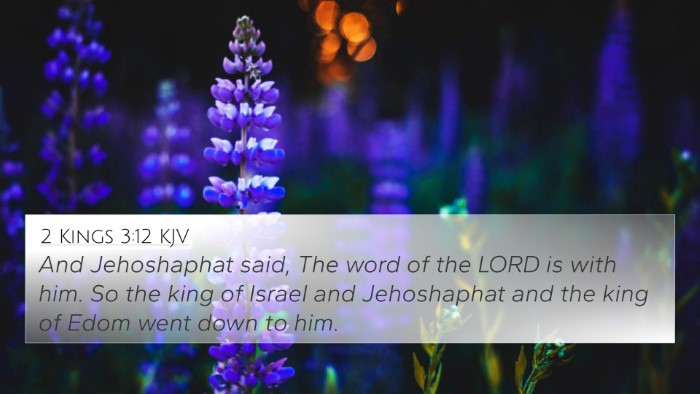Understanding 2 Kings 5:9
Verse: 2 Kings 5:9 - "So Naaman came with his horses and with his chariot, and stood at the door of the house of Elisha."
Context and Background
This verse occurs within the narrative of Naaman, a Syrian commander who seeks healing from leprosy. His story highlights the themes of humility, faith, and the recognition of God’s authority through a prophet. Elisha, representing God’s power, plays a crucial role in Naaman’s healing journey.
Verse Analysis
The act of Naaman arriving with his entourage signifies his high status and military leadership. He is a figure of power yet, in a moment of vulnerability due to his illness, he seeks help from a man of God. This juxtaposition demonstrates a central theme in biblical texts: the recognition of one's need for divine intervention despite earthly status.
Commentary Insights
-
Matthew Henry:
Henry emphasizes that Naaman’s arrival signifies more than just a physical journey; it marks a spiritual quest for healing. Henry points out the importance of Naaman's willingness to step out of his comfort zone, indicating a shift from pride to humility.
-
Albert Barnes:
Barnes discusses the implications of Naaman standing at Elisha’s door. This gesture shows his expectation and urgency in seeking healing. It also reflects the notion that God's help often comes from unexpected sources, emphasizing the humility required to accept it.
-
Adam Clarke:
Clarke highlights the cultural significance of Naaman's actions. By approaching a Hebrew prophet, Naaman defies social norms of the time. Clarke also points out that his coming signifies a willingness to submit to God’s authority.
Thematic Connections
The themes present in 2 Kings 5:9 resonate throughout the Bible, establishing connections between various scriptures. Here are some notable parallels and cross-references:
- James 4:10: "Humble yourselves in the sight of the Lord, and He shall lift you up." This underscores the significance of humility in seeking God's aid.
- Luke 4:27: "And many lepers were in Israel in the time of Eliseus the prophet; and none of them was cleansed, saving Naaman the Syrian." This showcases how God's blessings extend beyond borders.
- Matthew 8:10: "When Jesus heard it, He marveled, and said to those who followed, 'Assuredly, I say to you, I have not found such great faith, not even in Israel!'" Here, the theme of faith emerges as central to receiving God’s intervention.
- Isaiah 55:6: "Seek the Lord while He may be found, call upon Him while He is near." Naaman's journey illustrates the pursuit of God’s healing grace.
- 1 Peter 5:5: "Likewise you younger people, submit yourselves to your elders." This relationship dynamic resonates with the hierarchical undertones of Naaman approaching Elisha.
- Acts 10:34-35: "Then Peter opened his mouth and said: 'In truth, I perceive that God shows no partiality.'” Naaman’s story emphasizes that God’s grace extends to all, regardless of their background.
- Matthew 9:12: "But when Jesus heard that, He said to them, 'Those who are well have no need of a physician, but those who are sick.'" This connection explores the theme of recognizing one’s spiritual condition.
- Proverbs 3:5-6: "Trust in the LORD with all your heart, and lean not on your own understanding." Naaman had to trust Elisha’s word despite his own doubts, reflecting this principle.
- 2 Chronicles 7:14: "If My people who are called by My name will humble themselves, and pray and seek My face…" emphasizes the need for humility and divine seeking; a fundamental theme in Naaman's request for healing.
- John 14:13: "And whatever you ask in My name, that I will do, that the Father may be glorified in the Son." This connects to the theme surrounding the faith and authority of both Elisha and Christ.
Applying the Lessons of 2 Kings 5:9
Naaman’s visit to Elisha reminds us of the importance of humility, faith, and the acknowledgment of our need for divine support in our lives. Here are key takeaways for personal reflection:
- Humility: Recognizing our limitations and the need for God.
- Faith: Trusting God to work through unexpected means.
- Intercession: The importance of seeking prayer and support from others.
- Obedience: Understanding that God's instructions may require us to step outside our comfort zones.
- Inclusivity: Reflecting on God's mercy that reaches beyond cultural and societal barriers.
Conclusion
In exploring 2 Kings 5:9, we encounter a rich narrative filled with themes of faith, humility, and the search for divine healing. The cross-references connect this story to broader biblical themes, encouraging us to delve deeper into scripture and inviting a more profound understanding of God's workings in our lives.







